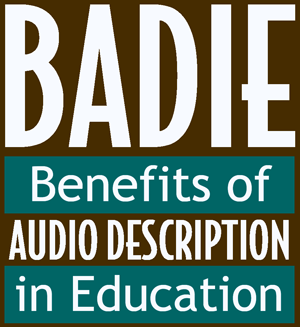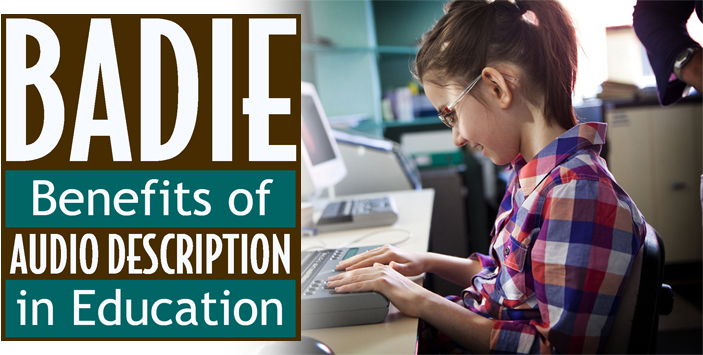<< Learning Center
Media Accessibility Information, Guidelines and Research
Benefits of Audio Description in Education (BADIE)
“Working on thinking critically about audio descriptions for this program has built Mae’s confidence. She has more to contribute when peers are talking about shows, YouTube, social media, and film, as she can now very clearly articulate access issues and why she likes some shows better or doesn’t know about others that may be very popular. Very cool! Thank you all, again.”
– Katie Lane-Karnas, teacher and mother of Mae Lane-Karnas, 2023 BADIE Grand Prize Winner
Movies, videos, and other forms of multimedia are integral to public, private, and special education curriculum. For young people who can't see or can't see well, audio description provides access to visual images that are crucial to understanding the meaning of the video content.
The Described and Captioned Media Program (DCMP) and the American Council of the Blind’s Audio Description Project (ADP) believe that awareness of and engagement with audio description can greatly enhance the educational experiences of students with no or low vision. The Benefits of Audio Description in Education (BADIE) essay contest invites young people ages 7–21 to compete for great prizes by watching a film with audio description and submitting a brief evaluation of the strengths (and/or weaknesses) of the audio description.

- Guidelines and Prizes
- Information for Teachers and Parents
- Information for Students
- What Makes Audio Description Good?
- Some Writing Tips
- How Essays Will Be Evaluated
- Submit Your Essay Now!
Guidelines and Prizes
- Entries will be accepted until April 1 for the May 2025 edition. Prize winners will be chosen from the published essays and announced at the start of the next school year.
- There are four entry categories: Sophomore (ages 7 to 10), Junior (ages 11 to 15), Senior (ages 16 to 21), and Alternate Assessment (non-traditional matriculation).
- Essays must be the student’s original work. Collaborative or plagiarized essays will be disqualified.
- Essays should be between 300 and 500 words long.
- There is no entry fee.
- There will be a first, second, and third place winner in each category, as well as a grand prize winner. First place winners and their teachers receive $100 gift cards; second place winners receive $50 gift cards; and third place winners receive $25 gift cards. The grand prize winner receives an iPad Mini, and the teacher receives a $100 gift card.
- Everyone who enters the contest will receive certificates of participation.
Information for Teachers and Parents
The BADIE essay contest is designed to encourage young people to hone their listening and writing skills. By engaging with accessible media and evaluating the quality and usefulness of audio description, students take part in an active learning exercise that also helps develop their critical thinking and analytical abilities.
Teachers and parents can browse thousands of educational audio described videos available for free on the DCMP website. Features such as Student Accounts and Interactive Transcripts help facilitate access and equitable learning environments.
Learn what audio description is, how it benefits students, and how it is created by consulting the DCMP audio description training module (note there is also a module for students). If you do not already have a DCMP account, you will be asked to create one before accessing the module.
Information for Students
Ask your teacher or parent to help you browse thousands of educational audio described videos available for free on the DCMP website. DCMP has media covering topics such as math, history, literature, and more. You can select a described episode of an educational television show or an educational video series. Choose one that’s interesting to you!
Learn what audio description is, how it benefits your learning experience, and how it is created by reviewing the DCMP audio description module (note there is also a module for teachers and parents). If you do not already have a DCMP account, you or your teacher will be asked to create one so you can access the material.
What Makes Audio Description Good?
The best audio description enhances your experience by describing visual elements that you might not be able to see; ideally, these descriptions shouldn’t distract you by going on too long, covering up the dialogue or important sound effects, or telling you what something means (you’re smart enough to figure out that part for yourself). Here are some things to consider when you’re thinking about the quality of the audio description:
- Accurate: The audio description should not contain errors or misleading words.
- Prioritized: The most important information is given top priority. Sometimes there are so many visuals on the screen that it’s impossible to describe them all. A good audio describer will only describe the elements that are most relevant to understanding the plot or lesson.
- Consistent: The description and the voicing should match the style, tone, and pace of the program. For example, if the video is about a serious topic, the voice shouldn’t sound too upbeat and cheerful.
- Appropriate: The description should be suitable for the audience of the video and use straightforward and succinct language.
- Equal: The meaning and purpose of the video should be clear, so that all students have equal access to the information.
Some Writing Tips
For this essay, there is no wrong answer! This is your chance to share your thoughts and tell us what you think about the audio description in a program of your choice. To help you craft your best essay, here are a few things to keep in mind about the writing process.
- Be prepared. Watch the video you’re writing about more than once. Take notes about the audio description – does it seem thorough or are there moments when you’re afraid something has been left out? Do you like the narrator’s voice – does it seem to fit the mood of the video? Does the description fit smoothly around the dialogue and sound effects of the video? What other things do you notice, good or bad? Remember that your essay will focus on the audio description, not the plot or quality of the film itself.
- Be organized. Before you write, think about what you want to say. Read over your notes and decide which points seem related to each other and should be grouped together. Create an outline to map out your ideas before you start writing. If you can’t fit all your ideas into the essay, choose the ones that are most interesting and fun to write about.
- Have a point. In essays, writers usually have a thesis statement that tells readers what their argument or main point is. The rest of the essay provides support and examples so readers understand why the writer is making that argument. You’ll want to state your thesis clearly in the first paragraph.
- Give examples. In your essay, you’ll be telling us what you think about the audio description in the video you watched, and just as importantly, you’ll be explaining why you think what you do. Include specific examples from the film that demonstrate each point you make in support of your argument.
- Keep it simple. Often, people are afraid to write because they think essays have to contain lots of big words and be kind of boring. But you wouldn’t want to read something like that, so don’t write what you wouldn’t like to read. Use your own unique voice and don’t worry about sounding fancy.
- Proofread. Yes, we want you to write your own words in your own way, but we need to be able to understand what you’re saying. That means you’ll need to follow the basic rules of spelling, grammar, and punctuation. Read your essay carefully to make sure it’s as free from errors as possible.
- Have fun! Accessibility and audio description are very important, but that doesn’t mean we have to be totally serious all the time. In fact, accessibility and audio description should help us participate in all kinds of activities, including fun ones, so relax and enjoy writing your BADIE essay!
- Also, don’t cheat. You already knew that, didn’t you? It can be helpful to discuss your ideas with teachers, friends, and family, but make sure that whatever ends up in your essay is yours. No one thinks or writes exactly the way you do – you are unique, so share your own thoughts and ideas. We can’t wait to read what you’ve got to say!
How Essays Will Be Evaluated
Most of our judges have experience working in the education sector. We’ll use the rubric below to help us assess the entries and select the winners. Teachers and students are encouraged to use these guidelines when working on essay submissions.
The rubric identifies three main elements to evaluate (style, thesis and support, and analysis), and three levels of achievement (excellent, successful, and needs improvement).
Style:
The essay has a clear authorial voice and flows smoothly, without distracting errors in word choice, grammar, or punctuation.
- Excellent: No or few noticeable errors.
- Successful: Some noticeable errors, but not enough to obscure the writer’s meaning.
- Needs Improvement: Many distracting errors that make the writer’s meaning difficult to understand.
Thesis and Support:
The essay contains a clearly-stated argument or opinion, provides examples to support that argument, and presents original thoughts and ideas.
- Excellent: The writer establishes an argument and includes multiple supporting examples, as well as cogent explanations of relevance.
- Successful: The writer states the topic of the essay, but the argument might lack strength or clarity. Support might not be consistently relevant or sufficiently linked to the argument.
- Needs Improvement: The essay does not contain an argument, but merely summarizes the film.
Analysis of Audio Description:
The essay examines multiple aspects of audio description, such as word choice, level of detail, narrator’s tone and voicing skills, and pacing. All elements do not need to be present.
- Excellent: The essay addresses multiple aspects of audio description and analyzes their relationship to the film.
- Successful: The essay addresses a couple aspects of audio description and assesses their relationship to the film.
- Needs Improvement: The essay focuses on the film itself rather than the audio description.
Submit Your Essay Now!
Submit your essay here: BADIE Entry Form
Entries will be accepted until April 1, 2025.
If you have any questions, contact:
Jason Stark, CEO, Described and Captioned Media Program
jstark@dcmp.org
Tabitha Kenlon, Audio Description Project Coordinator, American Council of the Blind
tkenlon@acb.org

